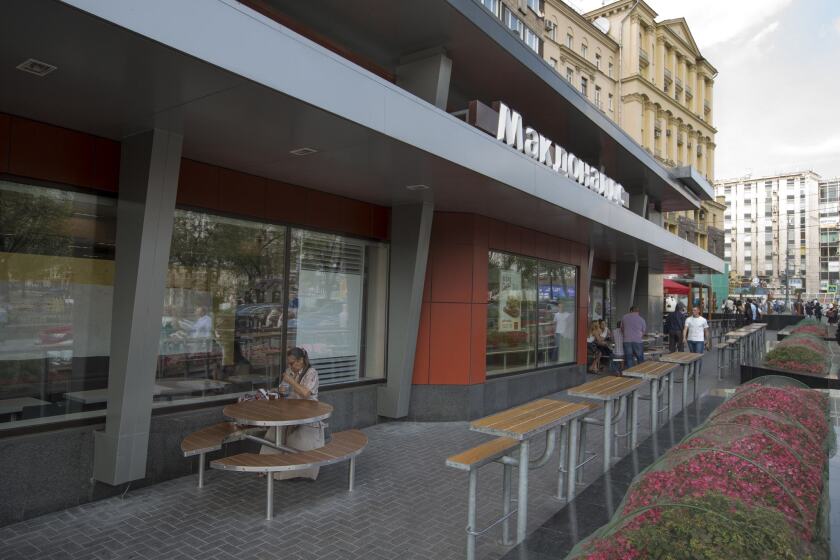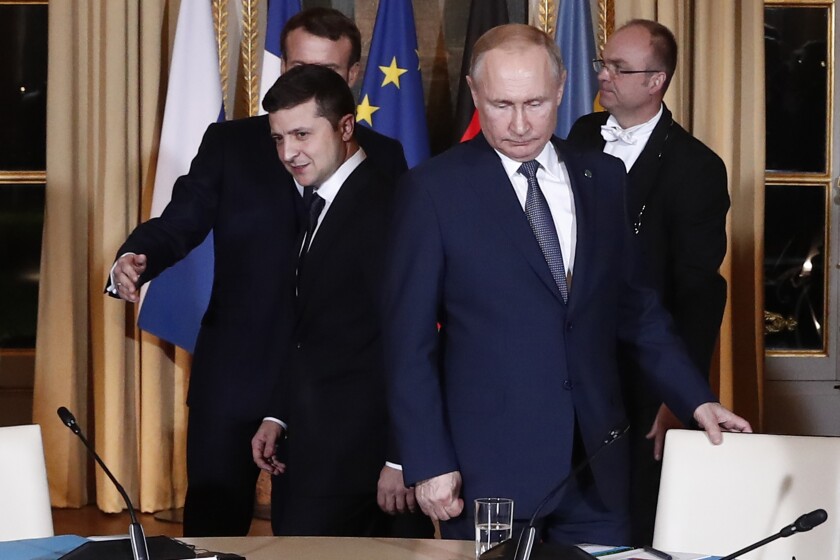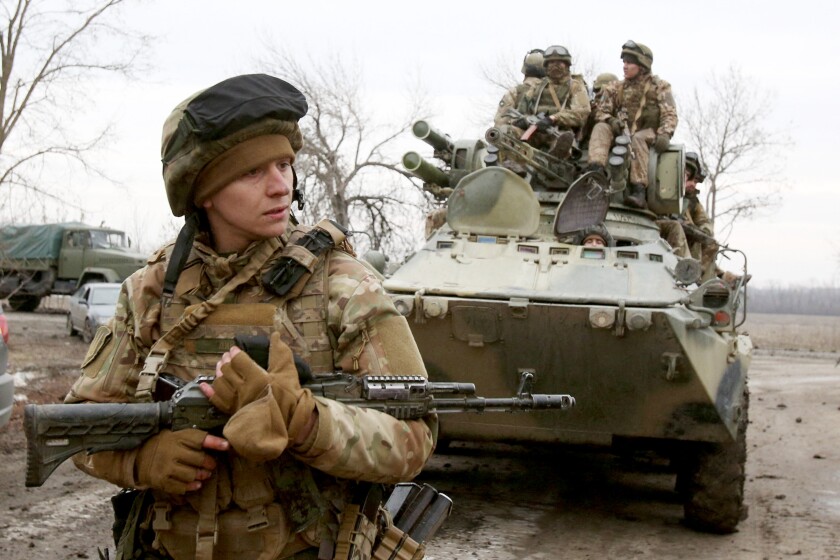Inquiring minds do wonder if McDonald's and Philip Morris have pulled their business from Russia will inadvertently prolong Russian life expectancy...JL
Michael Hiltzik reports in the Los Angeles Times:
Russia is in such bad odor internationally just now that trading with the country in any way risks a massive blow to a company’s public image. (But) major American consumer companies with exposure to Russia attribute single-digit percentages of revenues to that market. Analysis found that the average direct exposure to the Russian market among those companies is 4%. McDonald’s obtains the largest revenue share from Russia and Ukraine, about 9%. Other than McDonald’s, the company with the largest revenue share from Russia and Ukraine is the tobacco company Philip Morris, with 8%.In 1990, McDonald’s was the sharp end of the spear in helping open the economy of Soviet Russia to the Western world.
The opening of its first restaurant in Moscow’s Pushkin Square generated worldwide publicity as the launch of “capitalism diplomacy.” What was then the world’s biggest McDonald’s served a record 30,000 meals in a day.
Today, three decades later, McDonald’s 847 restaurants in Russia, of which 84% are company-owned, (are now closing). All of the 108 McDonald’s locations in Ukraine are also company-owned.
Those who nostalgically yearn for the USSR, will get to experience all of its glories for themselves.
ECONOMIST MAXIM MIRONOV
Consumer companies from Apple to Walt Disney Co. to Netflix have announced shutdowns of shipments and services to Russia in the wake of the country’s invasion of Ukraine.
Some have been forced by government orders to cease doing business with Russia, including manufacturers of high-tech equipment on which the U.S. and its European allies have placed embargoes. Some are constrained by Western freezes on financial transactions with the regime of Russian President Vladimir Putin.
But others have withdrawn from the Russian market voluntarily. Russia is in such bad odor internationally just now that trading with the country in any way risks a massive blow to a company’s public image.
As a result, private enterprise is in effect imposing its own sanctions on Putin.
Several companies involved in the Russian consumer market have not announced exits but expressed support for their employees in the war zone.
Estée Lauder Cos., which gets about 2.7% of revenues from Russia and Ukraine, says it will donate to support organizations “active in Ukraine and in neighboring countries” and will also be donating its products “to those displaced and those in need.” It says it is “continuously monitoring the situation and evaluating all possible measures” to support employees affected by the war.
Sanctions imposed by private companies differ from government sanctions, which are designed to place such crushing financial pressure on Putin that he has no choice but to end his war on Ukraine, or else risk the collapse of the Russian economy. The private company sanctions appear to be aimed more at protecting their own reputations.
Many corporate decisions to exit Russia come clothed in moral condemnation.
“We are compelled to act following Russia’s unprovoked invasion of Ukraine, and the unacceptable events that we have witnessed,” Visa CEO Al Kelly said Saturday in announcing that his company it would ban all transactions initiated with its branded credit cards issued by Russian financial institutions and all transactions inside Russia initiated on non-Russian cards. “This war and the ongoing threat to peace and stability demand we respond in line with our values.”
MasterCard, which took similar actions, attributed them partially to sanctions requirements. But the firm also said it had decided on its own to “suspend our network services in Russia” and referred in its announcement to the “shocking and devastating” consequences of the Russian invasion.
How long American and European countries will maintain their informal embargoes is hard to assess.
Among those intending to return to the Russian market, the critical issue is where to find the reentry point at which trading with Russia is again socially acceptable: Would it be the ceasing of the attack? The withdrawal of all Russian forces from Ukrainian territory? The resignation or ouster of Putin?
Some on Wall Street have even begun anticipating the end of the conflict and a possible recovery in the value of Russian assets. Goldman Sachs and JPMorgan Chase have begun buying Russian corporate bonds that have been reduced to junk status by sanctions, according to Bloomberg.
Market observers warn, however, that these are not conventional distressed assets of the sort that customarily attract bargain hunters, as dabbling in Russian securities under current conditions can be taken by the public as a sign of moral turpitude.
Although Russia has become integrated with Western economies, the country represents a relatively small share of revenues or profits for large multinationals.
Apple is estimated to lose $3 million a day in iPhone sales due to its embargo of the Russian market, according to a calculation by Burga, an iPhone case maker. That may sound like a lot, totaling more than $1.1 billion a year — but it’s virtually pocket change compared with worldwide iPhone sales of $192 billion in 2021.
Other major American consumer companies with exposure to Russia tend to attribute single-digit percentages of revenues to that market, according to an analysis by JPMorgan Chase. The analysis found that the average direct exposure to the Russian market among those companies is 4%.
For example, the cruise line Carnival Corp., which said it would drop St. Petersburg from its itineraries, gets 3.6% of its revenue from Russia and Ukraine, according to the analysis.
Most of the companies screened by the Morgan analysts for direct exposure to the Russian market haven’t yet announced withdrawals, but pressure on them is mounting. New York State Comptroller Thomas DiNapoli, who supervises the state’s $280-billion public pension fund, last week urged a raft of U.S. companies to suspend their operations in Russia on both financial and moral grounds.
Halting Russian operations, DiNapoli said in letters to the companies, “would address various investment risks associated with the Russian market and play an important role in condemning Russia’s role in fundamentally undermining the international order that is vital to a strong and healthy global economy.” The letters went to PepsiCo, McDonald’s, Mondelez International (the maker of snacks such as Oreo cookies), Estée Lauder, Kimberly-Clark and Coty, among others.
Of those companies, McDonald’s obtains the largest revenue share from Russia and Ukraine, about 9%. That figure is an artifact of the company’s business model, under which the vast majority of its stores worldwide, outside Russia and Ukraine, are owned and operated by independent franchisees, not the company itself.
Other than McDonald’s, the company with the largest revenue share from Russia and Ukraine is the tobacco company Philip Morris, with 8%, according to Morgan.
Americans are strongly in favor of companies’ cutting ties to Russia — 75%, according to a poll by Morning Consult, which said the sentiment crosses partisan lines. That suggests that remaining publicly identified with the Russian market is bad PR.
The most aggressive exits from Russian involvement appear to be taken by oil and gas companies, which in the past have been among the most enthusiastic partners in Russian deals.
Their participation isn’t surprising, because petroleum long has been Russia’s leading export. On the other hand, pressure is increasing for a global embargo on Russian oil, though that may well drive global oil prices, which have already been pushed over $130 per barrel, even higher.
ExxonMobil announced on March 1 that it would exit the Sakhalin-1 project in Russia’s far east and “will not invest in new developments in Russia.” The company, which valued its Russian assets at $4.6 billion in its 2021 annual report, didn’t say whether its withdrawal is permanent but tied it to “the current situation.”
There’s little question that the international sanctions — official government freezing of bank accounts and other financial assets as well as trading halts imposed by private companies — will strike hardest at ordinary Russian consumers. “Very soon, Russian will be faced with shortfalls of basic products,” Maxim Mironov, an economist at IE Business School in Madrid, observed last week on Twitter. “I’m not talking about iPhones ... but about food, clothing, cars, white goods, etc.”
This isn’t the first time that companies with long histories in Russia have experienced the drawbacks of doing business under the Putin regime.
In 2014, Putin‘s government targeted the company’s restaurants, which then numbered 435, for a raft of “sanitation” inspections in what was widely seen as retaliation for Western criticism of Putin’s annexation of the Ukrainian region of Crimea earlier that year. Nine were closed, including the landmark Pushkin Square location, though they were later reopened.
What remains unclear about the international community’s financial war on Russia is how it will affect Western investors, some of whom own assets stranded by the sanctions, or Western consumers, who may pay higher prices for gas or other products dependent on Russian natural resources. All that is clear is that the Russian economy is on the verge of being knocked back by decades, with a murky future.






















0 comments:
Post a Comment